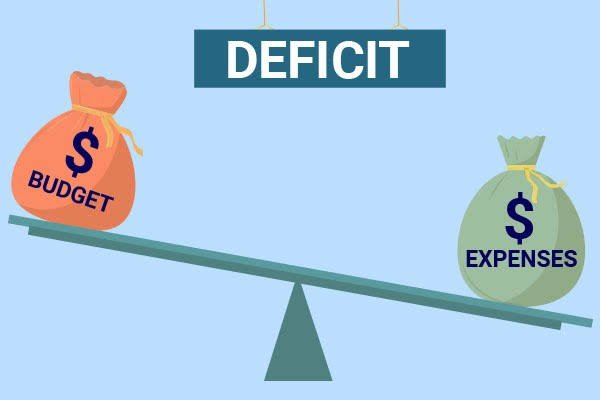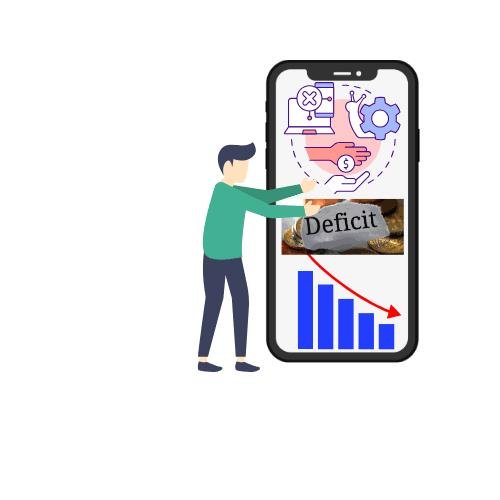Introduction
Budgeting is a crucial aspect of managing one’s finances, whether on a personal or governmental level. While the term “budget” often depicts images of careful planning and responsible spending, there is another side of budgeting that tends to be less well-understood but equally important: Deficit Budgeting. In this article, we will explore the concept of deficit budgeting, and provide insights into its implications on both individuals and governments.
Defining Deficit Budgeting
At its core, deficit budgeting refers to a situation where expenditures exceed revenues. In simpler terms, it means spending more money than you are receiving it. In the world of personal finance, this means living beyond your means, relying on credit cards, or taking out loans to cover daily expenses. However, when we talk about deficit budgeting in the context of governments, things become a bit different.
Certainly, let’s explore some additional aspects of deficit budgeting:
Types of Deficits:
⦁ Structural Deficit: This type of deficit occurs when a government consistently spends more than it collects in revenue, even during periods of economic growth. It often indicates underlying issues with government finances that may require structural reforms.
⦁ Cyclical Deficit: This deficit is tied to economic cycles. During economic downturns, tax revenues decline, and safety net expenditures increase, resulting in a temporary budget deficit. When the economy improves, this deficit typically shrinks or turns into a surplus.
⦁ Primary Deficit: This measure excludes interest payments on debt. It provides insight into whether a government can cover its ongoing expenses without relying on borrowing.
Understanding Government Deficit Budgeting
Governments, unlike individuals, have the unique ability to borrow money by issuing bonds or securities. These financial instruments allow them to cover budget shortfalls in the short term. The concept of deficit budgeting for governments involves intentionally planning to spend more than they anticipate collecting in revenue during a given fiscal year.
The Reasons Behind Deficit Budgeting
Now that we’ve defined deficit budgeting, let’s delve into why governments might choose to adopt this approach. There are several reasons why a government may decide to run a deficit budget:
⦁ Economic Stimulus: During times of economic downturn or recession, governments may increase their spending to stimulate economic growth. This can involve investing in infrastructure projects, offering subsidies to industries, or providing direct financial assistance to citizens.
⦁ Investment in the Future: Governments may incur deficits to finance long-term projects and investments, such as building new schools or hospitals. These projects are seen as essential for the country’s future prosperity.
⦁ Crisis Response: In times of unexpected crises, such as natural disasters or pandemics, governments may need to spend heavily on emergency response and relief efforts. Deficit budgeting can provide the necessary funds to address these challenges swiftly.
⦁ Maintaining Social Services: Governments often prioritize maintaining essential social services like healthcare, education, and public safety. During economic downturns, deficit budgeting can help safeguard these vital services.
Role of Central Banks:
⦁ Monetary Policy: Central banks often work together with governments to manage deficits. They can influence interest rates and money supply to help balance the economic consequences of deficits.
⦁ Quantitative Easing: In some cases, central banks implement quantitative easing, a policy of buying government securities to inject money into the economy during times of crisis. This unconventional approach aims to lower long-term interest rates and stimulate economic activity.
Political and Economic Implications:
⦁ Political Controversy: Deficit budgeting can be a political issue. Some argue that deficits are necessary for economic growth, while others emphasize fiscal discipline and reducing government debt.
⦁ Credit Ratings: Excessive deficits and rising debt levels can negatively affect a country’s credit rating. A lower credit rating can lead to higher borrowing costs for the government and businesses within the country.
⦁ Crowding Out Effect: High levels of government borrowing to cover deficits can crowd out private investment. When the government absorbs a significant portion of available funds, it leaves less capital for private sector investments, potentially slowing economic growth.
⦁ Long-Term Sustainability: Sustainable deficit budgeting involves assessing whether the government can meet its future obligations. Factors like an aging population and rising healthcare costs can strain government budgets over time.
Global Perspective:
⦁ International Comparisons: Different countries have varying approaches to deficit budgeting. Some nations, like Japan, have carried high levels of government debt for years without facing a crisis, while others, like Greece, have struggled with excessive deficits.
⦁ Global Financial Institutions: Organizations like the International Monetary Fund (IMF) and the World Bank closely monitor countries’ fiscal policies. They may provide assistance and advice to countries facing fiscal challenges.
⦁ Currency Impact: Deficit budgeting can influence a country’s currency value. A large deficit may lead to depreciation, affecting international trade and the purchasing power of citizens.
Public Perception:
⦁ Trust in Government: How the public perceives deficit budgeting plays a crucial role. Trust in the government's ability to manage deficits can affect economic stability and investor confidence.
⦁ Public Investment: Deficit spending on productive projects, such as infrastructure, education, and healthcare, can garner public support if citizens perceive these investments as beneficial to society.
The Pros of Deficit Budgeting
Deficit budgeting is not without its merits. Here are some of the advantages associated with this approach:
⦁ Economic Growth: By injecting money into the economy, deficit spending can boost economic activity and employment, leading to increased consumer spending and business investments.
⦁ Crisis Management: Deficit budgeting provides governments with the flexibility to respond effectively to unexpected crises, whether they are economic, environmental, or public health-related.
⦁ Infrastructure Development: It allows for the development of critical infrastructure that benefits society in the long term, creating jobs and improving the overall quality of life.
The Cons of Deficit Budgeting
However, deficit budgeting also comes with its fair share of drawbacks:
⦁ Debt Accumulation: Consistently running deficit budgets can lead to a significant accumulation of government debt. This debt must be serviced through interest payments, diverting funds away from other essential programs.
⦁ Inflation Risk: An excessive increase in the money supply, often associated with deficit spending, can trigger inflation, eroding the purchasing power of a nation’s currency.
⦁ Interest Burden: The interest on the accumulated debt can become a significant portion of the government’s budget, leaving fewer resources for other priorities.
Balancing Act: Managing Deficits
Governments must strike a delicate balance when it comes to deficit budgeting. Here are some strategies used to manage and mitigate the negative effects of deficits:
⦁ Fiscal Responsibility: It’s essential for governments to plan their budgets responsibly, ensuring that deficits are used for productive purposes.
⦁ Debt Management: Governments must monitor and manage their debt levels to avoid reaching a point where managing the debt becomes a burden.
⦁ Revenue Generation: Exploring avenues for increasing revenue, such as tax reforms or economic growth strategies, can help offset deficit spending.
Conclusion
In conclusion, deficit budgeting is a dynamic & multifaceted aspect of economics that applies not only to individuals but also to governments that intersect with politics, economics, and public perception. While it can be a powerful tool for stimulating economic growth and addressing crises, it must be approached with responsible management and a comprehensive understanding of its implications. As we navigate the complex world of economics, understanding the role of deficit budgeting empowers us to make informed decisions about our financial future. By striking a balance between fiscal responsibility and necessary spending, governments can harness the potential benefits of deficit budgeting while safeguarding long-term financial stability.




